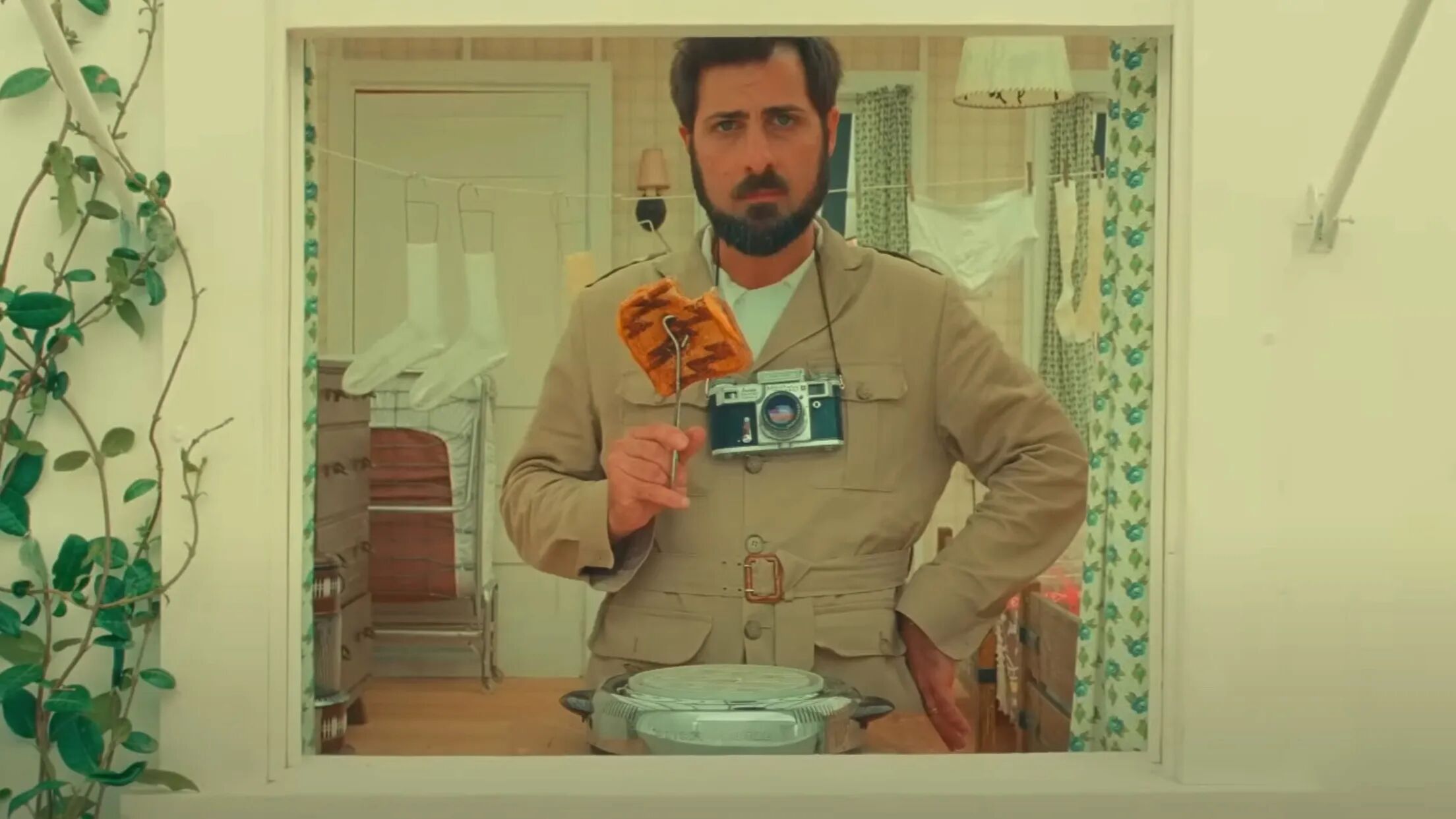Asteroid City, Wes Anderson’s latest candy-coated masterpiece, has hit theaters. As far as Anderson films go, it’s almost exactly what you’d expect. There’s a star-studded cast, kooky animation, a million subplots, and that signature dollhouse feel. But there’s something extra going on in Anderson’s latest opus, something more than a tad…you know…gay.
Asteroid City is, on the face of it, an ensemble comedy about a bunch of people tied together after witnessing an astonishing, once-in-a-lifetime event. I won’t tell you what that event is, but if you’ve seen the trailer for the film, I’m sure you can venture a guess. But it’s more than that, too: the film’s frame narrative places us in a strange position in regard to the drama. Not only do we get to see “Asteroid City,” the filmed play-within-a-movie, we get to meet its author, the brilliant, disturbed Southern playwright Conrad Earp, played magisterially by the great Edward Norton.
Now we don’t see too much of Earp in the film, and we’re told that his life is cut short by a fatal car accident before the play closes. But when we do meet Earp in some early scenes, we learn just enough about him to understand exactly who he’s modeled after: the famous gay playwright Tennessee Williams.
That’s right: unless I’m sorely mistaken (and I might be, but whatever) Conrad Earp is a sweet, subtle tip of the hat to the troubled, brilliant writer of “A Streetcar Named Desire” and “Night of the Iguana.”
Now let’s take a look at the facts: Earp, like Williams, became a sensation in the post-war period owing to his “poetic tapestries” for stage and screen. Like Williams, Earp is known for writing meaty roles for women actors, especially those in the budding method acting movement. And like Williams, Earp is gay. We don’t get to see much of this part of his life, other than a tender kiss with actor Augue (Jason Schwartzman,) but what we see is more than enough to convince of us Earp’s true blueprint. His Southern drawl, love of hyper-masculine Western art, and predilection for a very specific brand of ice cream (Gooseberry Wriggle) all feel like they belong completely to the man whose work on the stage defined the post-war era perhaps more than any.
Now I’m far from the only viewer who feels this way. Folks have already started posting segments of the script that seem to dive even deeper into Earp’s queerness.

Those tall reeds weren’t the only things that were shivering on set: the chemistry between Earp and Augie needs and deserves its own film. But I digress…
Williams, often painted as a tragic figure, enjoyed more success in his lifetime than most writers. From the moment “The Glass Menagerie” premiered on Broadway in 1944, audiences ate up Williams’ depictions of brassy, desperate women, decaying Southern glamour, and muscle-bound, weak he-men. Behind the scenes, of course, Williams had his own trouble. Losing his virginity to another man at the age of 27, Williams fell quickly into a series of sordid love affairs that often left him feeling used, depressed, and reaching for the bottle. After an early love died suddenly of a brain tumor, Williams started dipping his toes into the world of rent boys and paid lovers, one of which—a volatile youth named Pancho Rodríguez y González—often became physically violent toward the playwright, spurring an on-again, off-again affair that seemed to torture both men.
But with or without these affairs, Williams was already set on a tragic path. Wounded by his sister’s early nonconsensual lobotomy and disgusted by his family’s treatment of her, Williams dedicated his life to telling the truth on the page, and it took its toll on him. Even at the height of his success, his alcohol and barbiturate dependence made him a difficult man to know and love. In Truman Capote’s 1968 novel “Answered Prayers,” we see a vicious, thinly-veiled portrait of the artist as a hopeless drunk, surrounded by piles of dog excrement (he refused to take it for walks outside the apartment) and his own filth. Abandoned by those who cared about him and feeling used by those who stuck around, Williams died in 1983 after swallowing the cap of a bottle of nasal spray, presumably while drunk. He was 71.
If the world wasn’t kind to Williams while he lived, public memory has, thankfully, been much kinder. His plays still stand as some of the finest American dramas ever written, and his queerness—an open secret while he lived—is now seen as a crucial part of his story. And Anderson’s heartfelt portrayal of the sad, sensual Conrad Earp shows that.
Williams left his mark on gay culture, on American culture, on history itself. By choosing a Williams analog to drive home his point about how all of life is essentially a never-ending psychodrama that ties all of us together, Anderson is paying respect to a figure who paved the way for unflinching emotional truth in post-war art. Without Williams, we wouldn’t have the rich culture of American drama we have today: and artists like Anderson know that all too well.♦
Don't forget to share:
Help make sure LGBTQ+ stories are being told...
We can't rely on mainstream media to tell our stories. That's why we don't lock our articles behind a paywall. Will you support our mission with a contribution today?
Cancel anytime · Proudly LGBTQ+ owned and operated
Read More in Entertainment
The Latest on INTO
Subscribe to get a twice-weekly dose of queer news, updates, and insights from the INTO team.
in Your Inbox













